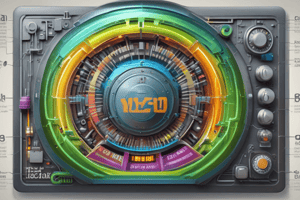Podcast
Questions and Answers
Which type of server has a high component density and requires advanced climate control?
Which type of server has a high component density and requires advanced climate control?
- Tower server
- Blade server (correct)
- Rack server
- All of the above
What is a key advantage of tower servers?
What is a key advantage of tower servers?
- Wide and short design
- Advanced climate control
- High component density
- Easy heat dissipation (correct)
Which server type is essentially an integrated desktop computer with a substantial footprint?
Which server type is essentially an integrated desktop computer with a substantial footprint?
- Blade server
- Rack server
- Tower server (correct)
- None of the above
What is a key disadvantage of tower servers?
What is a key disadvantage of tower servers?
Which server type is designed with a wide and short form factor?
Which server type is designed with a wide and short form factor?
Which server type can offer services like DHCP or DNS?
Which server type can offer services like DHCP or DNS?
What is a key advantage of a blade server compared to a rack server or tower server?
What is a key advantage of a blade server compared to a rack server or tower server?
In terms of size and application, what differentiates a rack server from a tower server?
In terms of size and application, what differentiates a rack server from a tower server?
What factor determines the heat generation in a rack server?
What factor determines the heat generation in a rack server?
When considering maintaining device uptime, which feature of a blade server is most beneficial?
When considering maintaining device uptime, which feature of a blade server is most beneficial?
In terms of heat dissipation, what is a notable characteristic of a tower server?
In terms of heat dissipation, what is a notable characteristic of a tower server?
Which type of server is primarily used for high-performance data clustering?
Which type of server is primarily used for high-performance data clustering?
What is the primary function of a rack server?
What is the primary function of a rack server?
Which of the following is NOT a standard height measurement for rack servers?
Which of the following is NOT a standard height measurement for rack servers?
What is a key advantage of rack servers mentioned in the text?
What is a key advantage of rack servers mentioned in the text?
What is the standard width measurement for rack servers?
What is the standard width measurement for rack servers?
Which of the following statements is true about 1U rack servers?
Which of the following statements is true about 1U rack servers?
Which type of server is NOT mentioned?
Which type of server is NOT mentioned?
Flashcards are hidden until you start studying
Study Notes
Server Types and Characteristics
- Advanced climate control is essential for high-density blade servers, resulting in additional costs for heating, cooling, and ventilation to ensure optimal performance.
Tower Servers
- Tower servers are essentially integrated desktop computers with a substantial footprint.
- They boast higher CPU power, fast read memory, and are designed to manage multi-user requests efficiently.
- They offer various services, including DHCP or DNS.
- Advantages:
- Upgrades and scalability: tower servers can be customized and upgraded as needed.
- Easy heat dissipation: tower servers have low component density and are easy to dissipate and cool.
- Versatile applications: they can meet the application requirements of common servers.
- Disadvantages:
- Bulky size and space occupation.
- Complicated server management.
- Absence of advanced components such as high-end graphics cards and RAM.
Rack Servers
- A rack server is a versatile server housed within a rack.
- Typically, rack servers are designed to accommodate various applications and serve diverse computing infrastructure needs.
- Rack-mounted servers are designed according to uniform standards, usually installed in a rack, and can be stacked and placed in a metal casing for easy management.
- Standard server rack dimensions are 1.75 inches high and 19 inches wide.
- Advantages:
- Enhanced reliability: easy mobility and deployment minimize the risk of failures.
- Only accommodates one server per rack section.
- Distributed form factor.
- Small size limits computing components.
- More blades can fit into the same space.
- Concentrated form factor.
- Equipped with complete facilities, all components operate independently.
- Additional memory, storage, and CPU provided internally to support expansion.
- Primarily used for high-performance data clustering.
- Hot-swappable internal configuration for device maintenance, reducing downtime.
Key Differences: Blade Server vs. Rack Server vs. Tower Server
- Blade Server:
- Wide and short design.
- Heat generation depends on the number of servers placed inside.
- Higher cooling costs due to concentrated heat generation.
- Rack Server:
- Much smaller in size.
- Suitable for stack management in server cabinets.
- Lower cooling cost.
- Tower Server:
- Larger footprint, often used in small offices or home networks.
- Requires only peripherals like monitors.
- Needs appropriate cooling facilities.
Studying That Suits You
Use AI to generate personalized quizzes and flashcards to suit your learning preferences.




